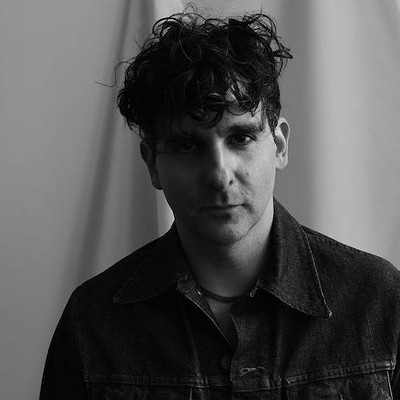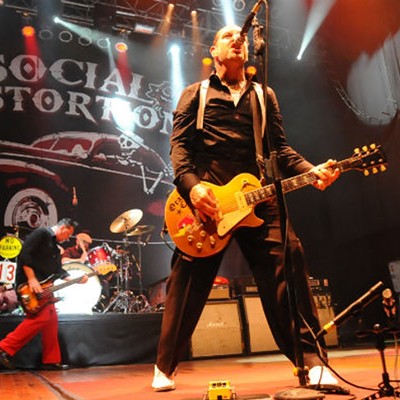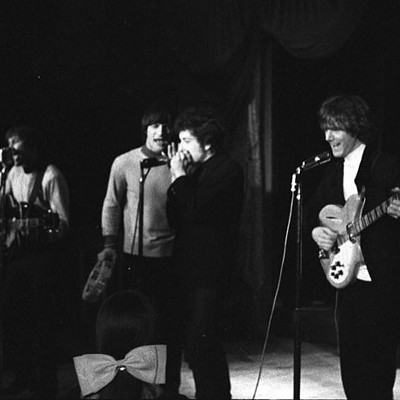Most people have entertained the fantasy of becoming a wealthy rock star, and a lot of them buy an instrument to fiddle around with. The majority of them eventually just throw that instrument into a closet after they move to another hobby, while a few become proficient players but never leave their bedrooms. This leaves a small number that actually form bands and take a stab at playing live to real audiences.
So what are some of the lessons that these aspiring rock stars are likely to learn or encounter on their way up (or down) the ladder of live music success? It's not all mountains of cocaine and groupie gang-bangs on the tour bus waterbed, is it?
Let's explore this further.
9. Almost No One Will Care About Your Band For Quite a While That's the hard truth. You might be great, your band mates equally adept at playing, but unless you've already been around your local scene for a few years and attracted some fans that might care about what your new band is doing, you will have to work your way up to that point. And it's hard. Lots of playing shows at shitty venues to a handful of personal friends and significant others that will come out to see "Death Hippie" play at noon on a Wednesday (if you're lucky).
I've known people that were so desperate to play that they'd gig just about anywhere, over-saturating themselves at shows almost no one would care to go to. Gothic band playing a taqueria? Great idea! How could that fail to shuttle a band to instant fame and success? At least the tacos are there to soak up your tears after playing to a homeless guy, your girlfriend and a stray dog that walked in.
It takes a lot of work and luck to build a fan base, even a small local one. If after a year or two of steady gigging that success hasn't happened, it's time to reevaluate the "plan," or the viability of "Death Hippie" itself.
8. Many Venues and Clubowners Are Assholes to New Bands It would seem like clubowners and the bands that play at their venues would have a close working relationship, maybe even a level of friendly cooperation since they both, in theory, want the same thing -- to pack the club with a huge crowd of people. Makes sense, right? Sadly, it turns out that's not always the case. Maybe not even usually the case, because bands and club owners want the same thing for different reasons.
Clubowners want a crowd, that is true, but they want a crowd of people willing to pay a cover and drink the shit out of some overpriced bar drinks. They don't care how they get to that outcome, and would gladly book a band of howling baboons instead of yours if they thought that would fill their club. In some places, they'll grant a newer band the "privilege" of playing their dive bar, but only if the band manages to presell a certain amount of tickets. If they don't, then they'll have to pay for any unsold ones themselves -- the dreaded "Pay to Play" scenario.
There are reasons that certain famous venues seemed to be at the center of musical revolutions. Besides being at the right time and right place, they usually had a clubowner who was willing to allow young unproven bands a chance to play and develop a scene. If Hilly Kristal had stuck to his original plan to feature country and bluegrass music at his Bowery bar, people might never have experienced the Ramones, and CBGB would likely be a long-forgotten dive. Most of those club owners are in their business purely for the money, and will book whoever can make them the most cash with the least amount of effort on their part. They simply don't care that Death Hippie could revolutionize the world of Jazzy Space Metal.
7. Not All Venues Are Created Equal I've seen too many bands booked in clubs that were bad matches for them, and it's a common mistake. It's probably more often a scenario in towns with fewer music venues, but I've seen weird band-to-club matches in cities with great places to play. I already mentioned the Gothic band playing at a taqueria (a real scenario I witnessed), but I've also seen hard-rock bands booked into restaurants that cater to sedate yuppies, and metal bands trying to work their magic at wine bars. If your style of music is likely to repel people and drive them from the type of venue you're playing, it might be time to look for a different place to play.
Story continues on the next page.
6. The Sound Man is Your Friend (Or Worst Enemy) This should be obvious, but I'm always surprised at how it somehow isn't. Assuming that you're playing a venue that regularly features live bands and is equipped with some form of in-house sound reinforcement, you're probably going to encounter a sound man or two. These range from completely unskilled imbeciles (a friendly/angry hobo that the bar owner has let in, for instance) to trained professionals (people who actually took classes to learn the trade).
These people can save or ruin your show. Be forewarned.
Being an asshole by ridiculing the dude's hideous blonde Afro or beak-like nose is not a good idea. Being dismissive or really demanding is also a dumb move. You don't want to kiss these guy's asses, but being somewhat friendly and positive when dealing with them is a good idea. If you're not, they can destroy your sound.
Up onstage in front of a crowd is a uniquely vulnerable position. It doesn't make things any easier to discover that the blond Afro and beak-nosed sound man you pissed off earlier has enacted his vengeance during the climax of your rock opera about kittens. Suddenly realizing that you can't actually hear the other players in your band, because your new enemy dropped all of it from your monitor is not a comfortable feeling.
It's best to not argue with these guys, unless you're paying them yourself. Also, developing a good relationship with them pays off if you plan on playing that venue again. Tipping or buying the guy a beer after the show are not bad ideas either.
5. Being In a Band Is Like Being in a Relationship It can even be a dysfunctional and abusive relationship, where the police are called and the neighbors hate you. I think most people start out forming bands with friends. It's likely that people in the same circle of friends will share similar taste in music, and also less likely that they'll tell you how much your playing sucks.
The problem is that being in any band is tough, and involves a lot of hard work under the best of circumstances. Just showing up to practices consistently and on time can be too much for some folks, and there's a lot of loading in and setting up of heavy equipment. If you have a lazy slacker "friend" in your band, resentment will build quickly.
After a certain point, it is likely that an ambitious musician may find himself or herself joining a band consisting of people he or she doesn't know, or doesn't know well. Yeah, probably everyone gets along all right, but they're not close friends. It's more like business partners in a very strange and difficult business. A person in this situation will get to see the best and worst of the people he or she is collaborating with.
If the band plays shows out of town, it's likely that the members will be cooped up in a van together, smelling the bass player's curiously fruity farts, and hearing the singer talk about how he once auditioned for "Whitesnake when they were trying to dump Coverdale" for the 200th time. You'd better be up for seeing the ugly and selfish side of your stinky bandmates, or this will slowly drive you crazy. If anyone in the band has a drug problem or is a drunk, you'll experience the fallout from that sooner or later; if they're 35 years old and like sex with teenage groupies, you'll deal with that too.
4. Bandmates Can Have Different Agendas. When I was in my first really serious band, I DID feel like we were a family. I felt an intense loyalty to them, and passed up some pretty good opportunities for myself as a result. If I'd treated being in that band less like being a member of a family or gang, and was more mercenary, I might still be touring in some outfit. Who knows -- I kind of sucked back then, but it might have happened.
Not every person in a band is always on the same page, or feels the same amount of loyalty to the band. Some treat it as a side project to what they'd really like to be doing, others want to secretly (or not so secretly) find a slightly more popular band to jump to. The point is, a lot of people base their band affiliation on what's in their own best interest. This is understandable, but it takes a concentrated effort by everyone to make anything happen, and having a bass player that wants to leave "Death Hippie" the minute "Ass Assassinator" asks him to join can be disruptive and demoralizing.
Story continues on the next page.
3. It's Like You're Also in a Relationship With the Other Members' Significant Others Make no mistake about this. When you join a band, not only are you entering a weird relationship with the other members, your entering a relationship with their significant others.
It's likely one or more members of any band will already be in some kind of romantic relationship, and will have a girlfriend or boyfriend, or husband or wife, lurking in the background. Even if not, being in a band automatically triples anyone's ability to attract a mate, and you will soon have at least one or two bandmates with a romantic partner. Totally normal right? That's certainly not a big deal, is it? Yes, yes it is.
Even if that significant other is a more or less cool person, he or she will likely tire of their boyfriend or girlfriend always being at a band function without them, and will start to come to every one of those functions. I've been in bands that had a "no girlfriends or boyfriends at practice" rule, and they still showed up.
The problem is that many of the basic things it takes to be a member of a popular band are not things that are good for a romantic relationship. There are reasons that this is a cliche. A bandmate with a significant other will have added pressure placed on him or her to choose the best interests of that person over what is good for the band. You finally got a dream show opening for a huge band? Oh wait. It's Charlie the cowbell player's girlfriend's birthday that night. He won't be able to make it.
Or the member in a relationship will have a built-in "No. 1 fan" that will usually eagerly point out how he's the most talented member in "Death Hippie" and the rest of the band needs him more than he needs them. Or maybe the significant other will just hate someone in the band for some reason, or have some strange problem with the direction the band is going in. It's also not going to make things easy if the singer's new girlfriend is a fundamentalist Christian and thinks the other members of "Death Hippie" worship Lucifer.
2. Image Is Important, Whether You Admit it or Not Ah, yes. A lot of bands get criticized for being image-based. Usually that goes hand in hand with "They have no talent" and "Anyone could dress up in those monkey suits and dance around." To a lot of people, "image" equals "not talented." This of course is a really stupid thing to believe. I suppose David Bowie never made any music worth listening to, but Poison sure did.
My point? Image shapes people's perception of a band, and gets their attention. But a LOT of musicians think that they can make it big without giving their image any thought at all. I can't count how many local bands I've seen where it looks like every member walked in from a different band. Your band better be AMAZING, and I mean transcendent, in their ability to entertain in an engaging way if you have a bass player that's 40 years old and dresses like an accountant, a drummer that looks like he wants to be in W.A.S.P, a singer who thinks a Hawaiian shirt and flip-flops are cool, and a guitar player who looks like he's in Duran Duran.
Actually, that sounds kind of awesome, like a kitschy '80s tribute band, but my point is that too many bands don't give any thought at all to how they will look on stage, or they have an actual stance against having an image of any kind. All this means is that they didn't choose an image, but the audience will choose it for them.
Unless they are the most amazingly brilliant band to ever come through town, the image that most audiences will assign such an outfit is "Suck" or "They looked stupid." Well played, anti-image band guys! No one is saying that a band has to dress up like Prince, but not wearing your clothes from the day job at Pizza Hut is a good rule of thumb.
1. Most Bands Aren't Democracies I think there's some lingering "fantasy" that many people, and even some musicians, have that bands are run like democracies. The idea is that everyone contributes equally in the decision making process, and every member has a hand in contributing to the songs. The fact is, I've never seen a band that operated like that.
I've been in a few that were closer to that ideal than others, but generally speaking someone has to steer the ship and usually one or two members make the lion's share of the band decisions, or at least have the deciding vote. They're usually the ones writing most of the songs, too. That doesn't mean that the other members don't contribute anything creative to the mix; usually they do. But hard feelings and jealousy will often arise when someone thinks he or she deserves to contribute more, and I understand that feeling.
Musicians tend to have egos, and we all like to think that we have some classic songs locked up inside, and if Andy the goddamned singer would just let me write one reggae song for "Death Hippie," then the world would see my genius.
Andy's a dick, though, and he owns the van.
ROCKS OFF'S GREATEST HITS
The Ask Willie D Archives Top 10 Bars Where Your Dog Will Be Welcome, Too The 10 Worst Metal Bands of the '80s 25 Ways to Know You Spend Too Much Time in Montrose Houston's Top 10 Hookup Bars
Follow @hprocksoff





